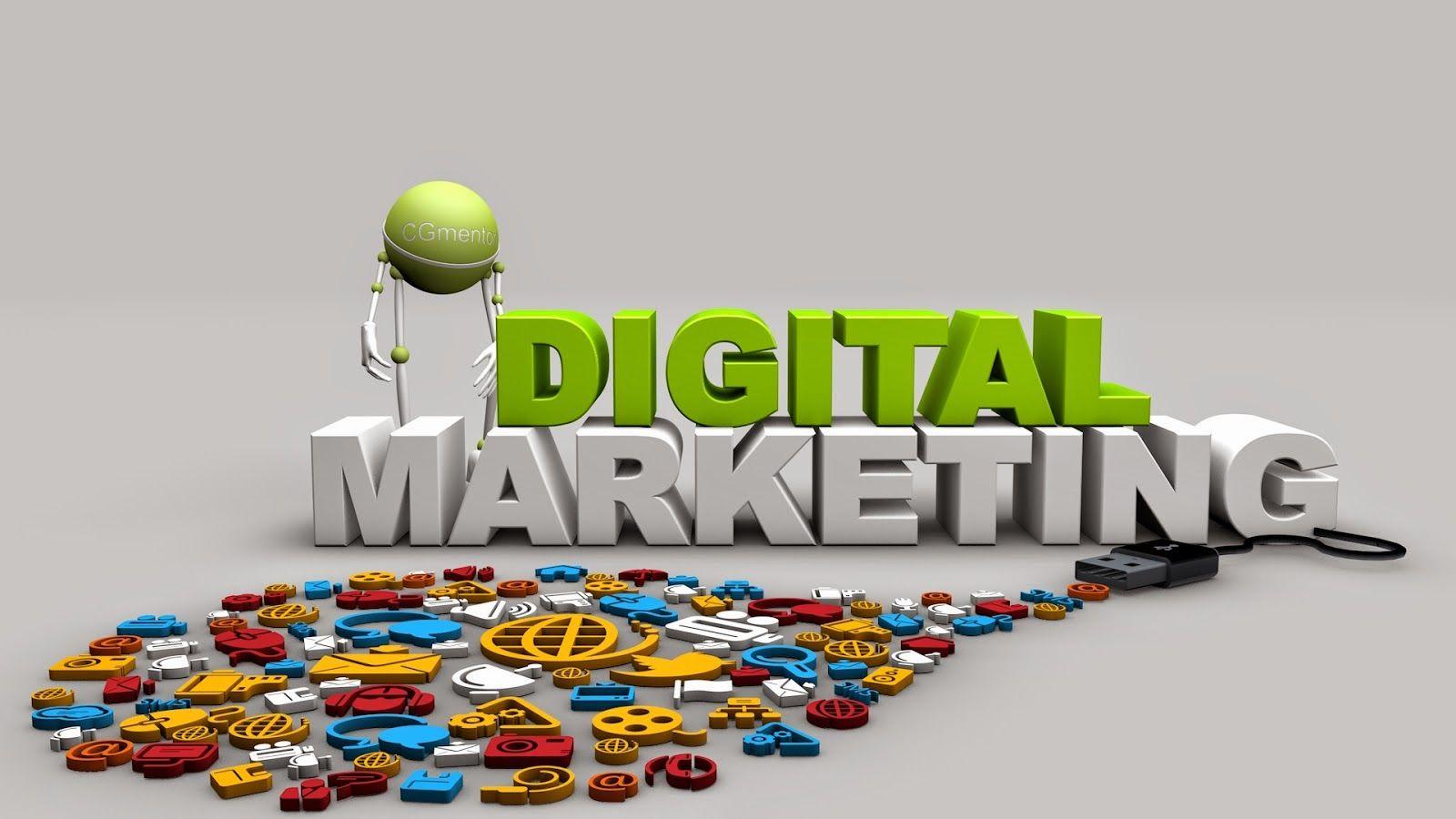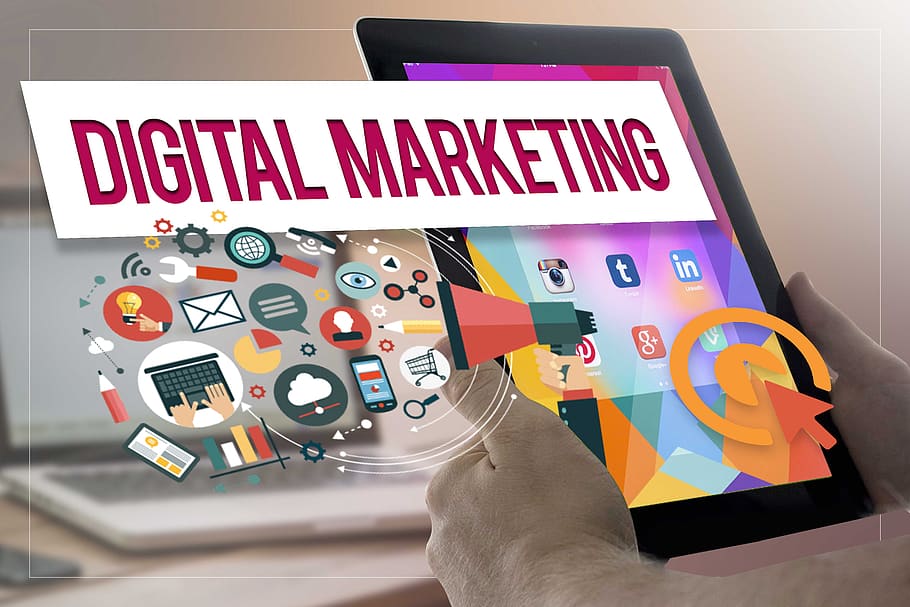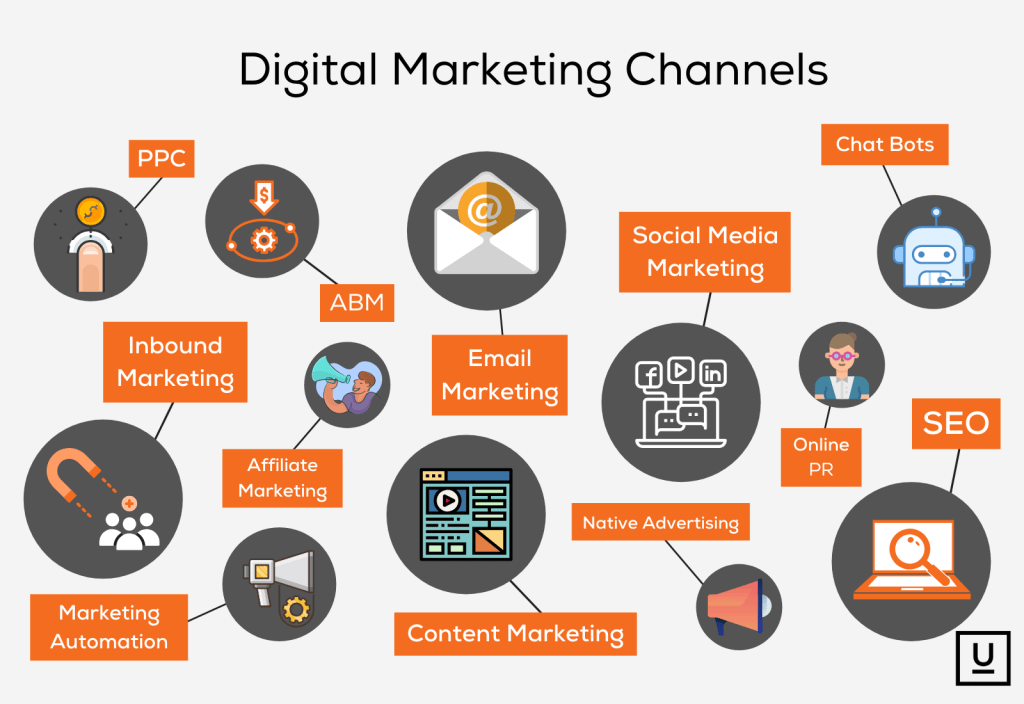Digital marketing is an essential tool for businesses of all sizes to grow their online presence, generate leads, and increase sales. With more and more consumers turning to the internet to research products and services, digital marketing has become an integral part of any successful business strategy.
At its core, digital marketing encompasses a wide range of tactics that can help you reach your target audience online. These include search engine optimization (SEO), social media marketing, email marketing, pay-per-click (PPC) advertising, content marketing, and more.

To get the most out of your digital marketing efforts, it’s important to develop a cohesive strategy that takes into account your business goals, target audience, and budget. This will help you identify the most effective channels to focus on and ensure that your messaging is consistent across all platforms.
One of the most important aspects of digital marketing is SEO, which involves optimizing your website and content to rank higher in search engine results pages (SERPs). This can be achieved through a variety of techniques, such as keyword research, on-page optimization, link building, and more.
Another key component of digital marketing is social media marketing, which involves using platforms like Facebook, Twitter, and Instagram to engage with your audience and promote your products or services. This can be a highly effective way to build brand awareness and drive traffic to your website.
Creating Your Identity: A Comprehensive Guide to Building a Strong Personal Brand

In today’s digital age, building a personal brand is more important than ever. Whether you’re an entrepreneur, freelancer, or simply looking to advance in your career, a strong personal brand can set you apart from the competition and help you achieve your goals. So if you are looking for a reliable and result-driven digital marketing company in Prayagraj, then look for best digital marketing company in Prayagraj. Contact us today to learn more about our services and how we can help your business grow! How do you go about building a personal brand that truly reflects who you are and what you stand for? In this comprehensive guide, we’ll explore the steps you can take to identify yourself and build a strong personal brand that will help you achieve success.
Step 1: Define your brand
The first step in building a strong personal brand is defining what you want your brand to represent. Ask yourself questions such as: What are my values? What am I passionate about? What are my unique skills and strengths? What sets me apart from others in my field? By answering these questions, you can begin to create a clear and concise brand message that reflects your personal identity.
Step 2: Establish Your Online Presence
In today’s digital age, a strong online presence is vital to building a personal brand. Start by creating profiles on social media platforms relevant to your industry, such as LinkedIn, Twitter and Instagram. Make sure your profiles are complete and up to date, and use a consistent tone and style across all your platforms. Consider creating a personal website to showcase your work and provide more information about yourself.
Step 3: Create Content
Creating content is an essential part of building a strong personal brand. This can include writing blog posts, producing videos, or sharing your thoughts and insights on social media. The key is to create content that is valuable, informative and relevant to your audience. By sharing your knowledge and expertise, you can establish yourself as a thought leader in your industry and build a loyal following.
Step 4: Network and Collaborate
Networking and collaboration are key to building a personal brand. Attend industry events, join professional organizations and connect with other professionals in your field. Seek opportunities to collaborate with others on projects or events that align with your brand message. By building relationships with others, you can expand your reach and find new opportunities.
The Benefits Of Digital Marketing To Your Business

Digital marketing has emerged as a powerful tool that can drive tangible results for businesses of all sizes and niches. In this article, we will explore the benefits of digital marketing and how it can positively impact your business. Digital marketing has gained popularity in part because it has such a big audience, but it also has a number of additional benefits. These are just a few of them:
Expanded Reach and Greater Visibility
Digital marketing allows your business to tap into a vast online audience, giving you the potential to reach customers globally. With the increasing use of search engines, social media, and other online platforms, digital marketing enables you to create a strong online presence, increase brand visibility, and connect with potential customers who are actively searching for products or services in your industry. This expanded reach can lead to higher brand awareness and increased traffic to your website, resulting in more leads and potential customers.
Targeted Marketing and Cost-Effectiveness
One of the key advantages of digital marketing is its ability to target specific audiences with precision. Through various digital marketing channels such as search engine optimization (SEO), pay-per-click (PPC) advertising, social media marketing, and email marketing, you can tailor your marketing efforts to reach the right audience based on demographics, interests, behavior, and location. This targeted approach allows you to allocate your marketing budget more effectively, ensuring that you are reaching those who are most likely to be interested in your products or services, and avoiding wasted spending on irrelevant audiences.
Improved Customer Engagement and Relationship Building
Digital marketing provides an opportunity to engage with your customers on a more personal level, building meaningful relationships and fostering customer loyalty. Through social media platforms, email marketing, and content marketing, you can create engaging and relevant content that resonates with your target audience, encourages interaction, and drives customer engagement. This can help you establish trust, credibility, and brand authority, leading to repeat business, word-of-mouth marketing, and positive online reviews, all of which contribute to long-term customer retention and increased customer lifetime value (CLTV).
Measurable Results and Data-Driven Insights
Unlike traditional marketing methods, digital marketing allows you to track and measure the performance of your marketing campaigns in real-time. With various analytics tools and data-driven insights, you can gain valuable information about your audience’s behavior, preferences, and engagement levels. This data can be used to optimize your marketing strategies, make informed decisions, and continuously improve your marketing efforts for better results. This data-driven approach enables you to identify what works and what doesn’t, allowing you to allocate your resources more effectively and drive higher return on investment (ROI).
Flexibility and Adaptability
In today’s fast-paced business environment, being agile and adaptable is crucial to stay ahead of the competition. Digital marketing offers the flexibility to quickly adjust your marketing strategies and tactics based on market trends, customer feedback, and business goals. You can experiment with different campaigns, channels, and messaging to find what resonates best with your target audience and adapt accordingly. This ability to pivot and optimize your marketing efforts in real-time allows you to stay relevant, competitive, and responsive to changing customer needs and preferences.
Types Of Digital Marketing

Understanding the different types of digital marketing can help you optimize your online efforts and achieve your marketing goals. Let’s explore some of the most common types of digital marketing. As there are different ways to communicate with digital media, there are also different specializations within digital marketing. Here are some prominent examples.
- Search Engine Optimization (SEO)
SEO is the process of optimizing your website and its content to rank higher in search engine results pages (SERPs). It involves various techniques like keyword research, on-page optimization, technical SEO, and link building to improve your website’s visibility on search engines. SEO helps drive organic (non-paid) traffic to your website and increases your chances of attracting relevant visitors who are actively searching for your products or services.
On Page SEO: Also known as on-site SEO, refers to the optimization of web pages to improve their search engine rankings and visibility. It involves optimizing various on-page elements such as meta tags, headings, URLs, image alt tags, and keyword placement within the content. On Page SEO also includes creating high-quality, relevant, and engaging content that provides value to users. By following best practices for On Page SEO, websites can attract more organic traffic, improve user experience, and ultimately achieve higher rankings on search engine results pages (SERPs).
Off-page SEO: Refers to the optimization efforts made outside of a website to improve its search engine rankings. This includes strategies such as building high-quality backlinks, social media marketing, online reputation management, and content marketing. Off-page SEO aims to increase a website’s authority, credibility, and visibility online, ultimately driving more organic traffic and improving search engine rankings. It is an important aspect of SEO that complements on-page SEO and helps improve a website’s overall online presence.
Technical SEO: refers to the process of optimizing a website’s technical elements to improve its search engine visibility and performance. This includes optimizing website structure, URL structure, website speed, mobile-friendliness, crawlability, indexability, and more. Technical SEO is crucial for ensuring that search engines can properly crawl and index a website, leading to higher rankings in search results. By implementing technical SEO best practices, websites can improve their chances of being discovered by search engines and ultimately increase their organic search traffic.
- Pay-Per-Click Advertising (PPC)
PPC advertising is a type of online advertising where you pay for each click on your ads. Google Ads is one of the most popular platforms for PPC advertising. You create and run ads that appear on search engine results pages or other websites, and you only pay when someone clicks on your ad. PPC allows you to target specific keywords, demographics, and locations, and it can be a highly effective way to drive targeted traffic to your website and generate leads or sales.
- Social Media Marketing
Social media marketing involves leveraging social media platforms like Facebook, Instagram, Twitter, LinkedIn, and others to promote your brand, engage with your audience, and drive traffic to your website. It includes creating and managing social media profiles, posting regular content, running paid ads, and engaging with your followers. Social media marketing helps you build brand awareness, engage with your audience, and drive traffic to your website, ultimately leading to increased conversions and sales.
- Content Marketing
Content marketing focuses on creating and distributing valuable and relevant content to attract and engage your target audience. It includes various types of content such as blog posts, articles, infographics, videos, podcasts, and more. Content marketing helps establish your brand as an authority in your industry, educates your audience, and builds trust. It also plays a crucial role in improving your website’s SEO, as search engines love fresh and high-quality content.
Email Marketing
Email marketing is a powerful tool for nurturing leads and building relationships with your audience. It involves sending targeted and personalized emails to your subscribers to promote your products or services, share valuable content, and keep them informed about your brand. Email marketing allows you to segment your audience, automate campaigns, and track the performance of your emails, making it a cost-effective and efficient way to engage with your audience and drive conversions.
- Influencer Marketing
Influencer marketing involves partnering with influencers or popular individuals in your industry to promote your products or services. Influencers have a significant following and influence over their audience, and their recommendations can have a significant impact on purchasing decisions. Influencer marketing can help you reach a wider audience, build brand awareness, and generate trust among your target customers.
- Affiliate Marketing
Affiliate marketing is a performance-based marketing strategy where you partner with affiliates who promote your products or services on their websites or other marketing channels. Affiliates earn a commission for each sale or lead they generate. Affiliate marketing allows you to leverage the reach and influence of affiliates to promote your brand, and it’s a cost-effective way to drive sales and leads without upfront costs.
Social Media Marketing company

Social media marketing refers to the use of social media platforms to promote a product, service, or brand. It involves creating and sharing content on social media networks such as Facebook, Instagram, Twitter, LinkedIn, and others, with the aim of engaging with a target audience, increasing brand awareness, driving traffic to a website, and ultimately, increasing sales.
if you’re looking for the best social media marketing company in Prayagraj, look no further than Digi Media Help. With their expert guidance, customized strategies, focus on results, transparency, and excellent customer service, they can help you take your business to the next level.
Social media marketing can involve a variety of tactics, such as creating and sharing posts, images, and videos that are relevant and engaging to the target audience, using hashtags and keywords to increase visibility, engaging with users through comments, direct messages, and chatbots, and running social media ads to reach a wider audience.
Effective social media marketing requires a deep understanding of the target audience, their needs, interests, and behaviors, as well as a clear strategy and a consistent presence on social media. It can be a powerful tool for businesses of all sizes to connect with customers, build relationships, and grow their brand.
How To Pick A Digital Marketing Strategy That Works
Are you struggling to decide on the right digital marketing strategy for your business? With the rapidly evolving landscape of online marketing, it’s crucial to select a strategy that is effective and aligned with your business goals. To help you make an informed decision, we’ve put together this SEO-friendly content on how to pick a digital marketing strategy that works.

- Define Your Objectives
Before you dive into choosing a digital marketing strategy, it’s essential to define your business objectives clearly. What are you trying to achieve with your digital marketing efforts? Is it to increase brand awareness, generate leads, drive sales, or improve customer engagement? Understanding your objectives will help you choose a strategy that aligns with your goals.
- Know Your Target Audience
Understanding your target audience is fundamental to any successful marketing strategy. Who are your ideal customers? What are their demographics, preferences, and online behavior? Conduct thorough market research to identify your target audience’s needs and preferences, as this will enable you to tailor your digital marketing strategy to reach and engage with them effectively.
- Assess Your Resources
Another crucial factor in choosing a digital marketing strategy is to assess your available resources. What is your budget for digital marketing? What are your internal capabilities and expertise? Consider your budget, team size, and skill sets to determine which strategy is feasible for your business. For example, if you have a limited budget, focusing on content marketing or social media marketing might be more suitable, while paid advertising might be an option if you have a larger budget.
- Research Different Strategies
Digital marketing encompasses a wide range of strategies, including search engine optimization (SEO), pay-per-click (PPC) advertising, content marketing, social media marketing, email marketing, and more. Research each strategy thoroughly to understand its pros, cons, and potential impact on your business. Consider factors such as cost, reach, scalability, and effectiveness in meeting your objectives.
- Consider Your Industry and Competition
Your industry and competition can also influence your choice of digital marketing strategy. Research your industry to understand the trends, customer behavior, and competitive landscape. Analyze your competitors’ digital marketing efforts and identify what strategies they are using successfully. This information can help you make an informed decision about which strategies are likely to work best for your business in your specific industry.
- Test and Measure
Once you have chosen a digital marketing strategy, it’s important to continuously test and measure its effectiveness. Set up key performance indicators (KPIs) and track the results regularly. This will allow you to identify what’s working and what’s not, and make necessary adjustments to optimize your strategy for better results.
- Stay Updated with Industry Trends
Digital marketing is a rapidly evolving field, and staying updated with industry trends is crucial for success. Keep yourself informed about the latest updates, algorithm changes, and best practices in digital marketing to ensure that your chosen strategy remains effective over time.
Conclusion:
Digital marketing is an essential component of any modern business. By leveraging digital channels such as search engines, social media, email, and websites, businesses can reach a wider audience, target specific demographics, and track their ROI. By implementing effective digital marketing strategies such as SEO, social media marketing, content marketing, and email marketing, businesses can improve their online visibility and drive more traffic to their website.

